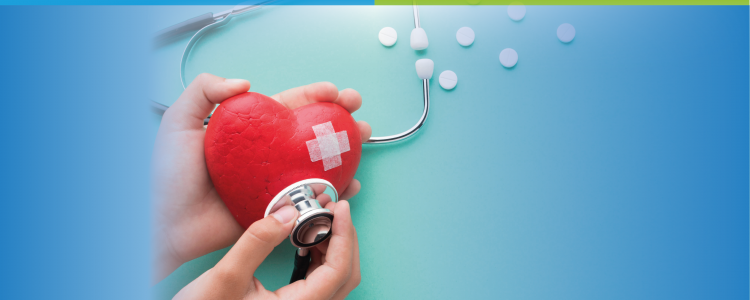Heart Problems, Diagnosis & Treatment

A condition that affects the heart’s structure or function is considered heart disease. People often refer to heart disease as one condition. Heart disease, however, is an umbrella term for several conditions.
Let’s understand different heart diseases:
Coronary artery disease
What: More than 10 million people are diagnosed with Coronary artery every year in India. This happens when the major blood vessels of the heart are damaged or diseased. Plaque build-up causes this condition. It restricts blood flow to the heart by narrowing coronary arteries.
Symptoms: Symptoms of coronary artery disease are diverse and can range from no symptoms to chest pain to heart attack.
Treatment: Treatment options include lifestyle changes, medication, angioplasty, and surgery.
Heart rhythm disorders (arrhythmias)
What: Happens because of the irregular beating of the heart. When the heart’s electrical impulses do not function properly, the condition is called cardiac arrhythmia.
Symptoms: It may not show any symptoms. However, fluttering in the chest, chest pain, dizziness, and fainting can be seen because of this condition.
Treatment: The treatment may involve anti-arrhythmic drugs, medical procedures, implants, and surgery, as needed.
Structural heart disease
What: It refers to a defect within the heart’s walls, valves, or chambers. It can either be congenital (present at birth) or develop over time.
Causes: Having high blood pressure, atherosclerosis, taking certain medications, having a previous heart attack, rheumatic fever, endocarditis, cardiomyopathy, or having certain other infections increases your risk of structural heart disease.
Treatment: There are several minimally invasive procedures available to treat structural heart disease, depending on the situation. Transcatheter aortic valve replacement (TAVR), alcohol septal ablation, mitral clip, and Amplatzer septal occluder are among the treatments.
Heart failure
What: Heart failure is a chronic condition that causes the heart to pump blood poorly. Insufficient pumping or filling can lead to heart failure (systolic or diastolic).
Symptoms: Shortness of breath, fatigue, swelling of the legs, and a rapid heartbeat are some symptoms.
Treatment: The treatment may include reducing salt intake, limiting fluid consumption, and taking prescription medications. A pacemaker or defibrillator may be implanted sometimes.
Risk factors for heart diseases:
Cardiovascular disease is largely caused by high blood pressure, high cholesterol, and smoking. Other conditions and lifestyle choices can also put people at risk for heart disease, including:
- Having diabetes
- Being overweight
- Eating an unhealthy diet
- Lack of physical activity
- Excessive alcohol consumption
Diagnosis of heart problems:
Different tests are available for diagnosing heart disease. The doctor will begin by taking your personal and family medical history, recording current and past symptoms, and doing laboratory tests. Further tests may be ordered based on the results of the assessment and tests.
There are some tests that are non-invasive, meaning no instruments are inserted into the body. However, there are others that are invasive and require the insertion of instruments.
Different diagnosis methods include:
Laboratory Tests- Blood tests
- Lipid profile
- Lipoprotein (a)
- C-reactive protein (CRP)
- Homocysteine
- Complete blood count (CBC)
- Fasting glucose
Non-Invasive Tests
- Electrocardiogram
- Echocardiogram
- Stress EKG
- Nuclear Stress Test
- Carotid Ultrasound
- Abdominal Ultrasound
- Holter Monitor
- Event Recorder
Invasive Tests
- Cardiac Catheterization and Coronary Angiography
- Electrophysiology Study
Treatment methods:
The severity and condition of heart disease determine how the disease is treated. While lifestyle changes can be helpful in one kind of heart condition, other condition may require an implantable device, such as a pacemaker. Your doctor will determine the best treatment plan for your situation. Ensure that you follow their instructions carefully and completely.
Treatment for heart disease can include:
Lifestyle Modifications
Heart disease management often begins with lifestyle modifications. A heart-healthy lifestyle includes eating a low-fat, low-sodium diet, exercising regularly, and quitting smoking.
Medication
Medications may be prescribed when lifestyle changes do not cure heart disease. The type of medication prescribed is determined by the severity of the condition.
Surgery
Sometimes, surgery is required when lifestyle changes and medication are not sufficient. Depending on the type of heart disease and the amount of damage to your heart, your doctor may recommend a different procedure.
Successful treatment of heart disease requires a holistic approach. At OMNI Hospitals, our team of highly experienced doctors and trained nurses treat all kinds of heart diseases. Our state-of-the-art facilities, groundbreaking technology, and dedicated team of doctors provides patients with quality healthcare at an affordable price.
Get in touch with the best heart specialists at 8880101000.
